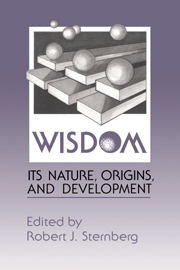Book contents
- Frontmatter
- Contents
- List of contributors
- Preface
- Part I Approaches to the study of wisdom
- Part II Approaches informed by philosophical conceptions of wisdom
- Part III Approaches informed by folk conceptions of wisdom
- Part IV Approaches informed by psychodevelopmental conceptions of wisdom
- 9 The loss of wisdom
- 10 Wisdom and Reflective Judgment: knowing in the face of uncertainty
- 11 Wisdom: the art of problem finding
- 12 An essay on wisdom: toward organismic processes that make it possible
- 13 Conceptualizing wisdom: the primacy of affect–cognition relations
- Part V Integration of approaches and viewpoints
- Name index
- Subject index
11 - Wisdom: the art of problem finding
Published online by Cambridge University Press: 05 June 2012
- Frontmatter
- Contents
- List of contributors
- Preface
- Part I Approaches to the study of wisdom
- Part II Approaches informed by philosophical conceptions of wisdom
- Part III Approaches informed by folk conceptions of wisdom
- Part IV Approaches informed by psychodevelopmental conceptions of wisdom
- 9 The loss of wisdom
- 10 Wisdom and Reflective Judgment: knowing in the face of uncertainty
- 11 Wisdom: the art of problem finding
- 12 An essay on wisdom: toward organismic processes that make it possible
- 13 Conceptualizing wisdom: the primacy of affect–cognition relations
- Part V Integration of approaches and viewpoints
- Name index
- Subject index
Summary
Whereas there can be wisdom in answers that are given or in problem solutions, wisdom is not simply defined by solutions or by answers. Wisdom may be more a matter of interrogatives rather than of declaratives. Answers and problems with their solutions are parts of a larger whole that include the formulation of the problem and the question(s) that drove that formulation. Wisdom is found more in particular questions that are posed than in the solutions that are given form by those questions.
Wertheimer (1945, p. 123) argued that the “ … function of thinking is not just solving an actual problem but discovering, envisaging, going into deeper questions. Often, in great discovery the most important thing is that a certain question is found.” The same may be said of wisdom. Wisdom may be recognized not so much by the problem solution but rather by the question or problem that is found. Wisdom may be the means by which one discovers, envisages, or goes into deeper questions.
Some of these deeper questions are the productive questions of Wertheimer (1945), the generic questions of Mackworth (1965), and the new problems of Piaget (1980): “Clearly though the modest facts assembled may have permitted us to answer a few minor outstanding questions, they continue to pose a host of problems. … [but] new problems are often more important than the accepted solutions” (Piaget, 1980, p. 304).
- Type
- Chapter
- Information
- WisdomIts Nature, Origins, and Development, pp. 230 - 243Publisher: Cambridge University PressPrint publication year: 1990
- 71
- Cited by

